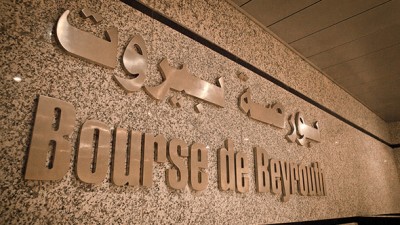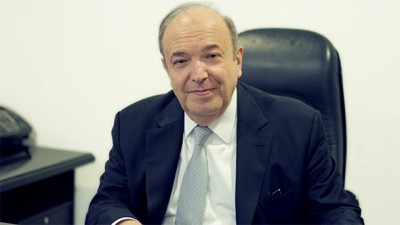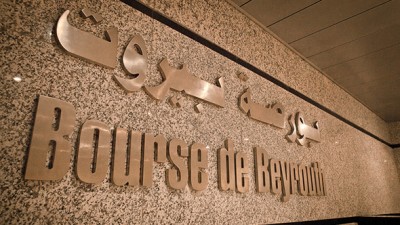 During an interview with Ghaleb Mahmassani, Vice President of Beirut Stock Exchange ( BSE) he revealed that despite the fact the BSE is considered one of the smallest stock exchanges has recently signed a letter of intent with the New York Stock Exchange in order to launch over the coming two years, an advanced electronic trading system.
During an interview with Ghaleb Mahmassani, Vice President of Beirut Stock Exchange ( BSE) he revealed that despite the fact the BSE is considered one of the smallest stock exchanges has recently signed a letter of intent with the New York Stock Exchange in order to launch over the coming two years, an advanced electronic trading system.
Could you begin by telling us about the size, organisational structure and the type of financial instruments being traded at the Beirut Stock Exchange?
Even though the Beirut Stock Exchange is one of the oldest stock markets in the region, in terms of its size, it is considered one of the smallest. It is also smaller than the Lebanese economy, with a market capitalisation to GDP ratio below 30%. We only have ten companies listed on the stock exchange. The current market capitalisation is close to 11 billion US dollars. The volume and value of shares traded on the Beirut Stock Exchange is very small. The Beirut Stock Exchange has an average daily turnover of 1.7 million US dollars. This is attributed to the fact that there are relatively few companies and banks listed, and their activity has been affected over the last few years by the general economic and financial crisis, as well as the political situation in Lebanon.
As for the structure of the Beirut Stock Exchange, it incorporates three types of markets: the official market, the junior market, and the over-the-counter market. The official market is for companies incorporated for more than 3 years, with a capital equivalent of at least 3 million US dollars, and having distributed a minimum of 25% of their share capital to the public, where such percentage is held by at least 50 shareholders. The junior market is for newly established companies, with a capital equivalent of at least 1 million US dollars, and having distributed 25% of their share capital to the public, where such percentage is held by at least 50 shareholders. The over-the-counter market is for Lebanese companies with a capital equivalent of at least one hundred thousand US dollars, and these shares are usually traded without being listed on the Beirut Stock Exchange.
The different types of financial instruments that are being traded on the stock market are common shares, preferred shares, GDR Global Deposit Receipts, and Lebanese government euro bonds.
One of the instruments that deserves closer attention is the Lebanese euro bonds with a dollar denominated interest, because they have been such a steady seller. They have proved very popular with a variety of investors, including the banking sector. What is the popularity of these euro bonds and how much trading they represent?
The Lebanese euro bonds can be traded either on the Beirut Stock Exchange or through commercial banks, and in fact, many more operations are being done through the commercial banks than through the Beirut Stock Exchange. As you mentioned, retail trading on outstanding Lebanese euro bonds is becoming very popular because many Lebanese and foreign investors are buying these euro bonds as they carry a high yield. In other words, there was a drop in key international interest rates, which encouraged many of the holders of international bonds to seek other means of good income. Thus, the low interest rates abroad have boosted the demand for the Lebanese euro bonds, making them very attractive.
Which are the main banks that are trading these bonds?
All of the banks here like to be involved in this kind of activity because there is a lot of profit to be made on the financial market, aside of classical lending. Of course, the bigger banks have the lion share in trading these bonds; these banks include Blom Bank, Bank Audi, and Byblos Bank.

How much of a reflection of the Lebanese economy do we see in terms of the exchange trading activity? For instance, on the day the new cabinet was formed several months ago, we saw very heavy trading over the next several days.
The Beirut Stock Exchange has undoubtedly benefited from the relative, recent improvement in the political and security environment. For instance, the volume of shares traded during the first four months of 2014 totalled 19 million shares for a value of 138 million US dollars, compared to 14 million shares for a value of 89 million US dollars for the corresponding period of 2013. This represents an increase of 36% and 55% respectively on volume and value traded on the stock market in this four-month period. Likewise, we saw an upward price movement during this period. However, we have to mention that the parliamentary and presidential elections scheduled for 2014 may add again to the political uncertainty during the rest of this year and may negatively affect the improvement we have seen during the first four months.
If there was a resolution for the formation of a new cabinet and if security was assured would we see good, steady trading on the stock exchange?
The election of a new president and the formation of a new government, with a general consensus between both political parties, will certainly improve the activities, coupled with an easement of the relations in the region between Iran and the Arab gulf will certainly have a positive effect.
Given the family ownership structure of many Lebanese mid to large sized companies, how could these entities be induced to become publicly traded, listed stock companies?
This is a very important issue and is really the main problem that affects the normal development of the Beirut Stock Exchange, because most of Lebanese businesses, industries, and services are family owned. Therefore, the personal relationships between the individual partners tend to prevail over all other forms of interaction. We have tried several times as a committee to correct this situation by meeting with all the family owned companies to show them the importance of raising capital through the stock exchange to improve their future development. However, this has yet to give any results because many of these family-owned companies have easy access to bank financing. The banks tend to know the general managers, etc. of these companies, and as the banks have an excess of liquidity, they can offer them interesting proposals. These companies prefer to have banking capital than stock exchange capital because with the banks they can keep their independence; they do not have to have new shareholders whom they do not know or board members who will come and see or interfere with what they are doing. They prefer to maintain their freedom and the banks obviously prefer this situation. That is why we have this banking culture, which is not likely to change unless we offer the companies important incentives, such as tax incentives and others. If these companies do not see any advantages in going public then why would they list on the stock exchange?
How do you educate people about how to buy shares, reasons for investing etc.?
This is a challenge; we are starting to educate university students. In this way, the junior investors are beginning to learn about the stock market.
Nevertheless, you have said that there is a younger generation of more financially well informed Lebanese business people coming into play here, who realise the benefits of getting capitalisation to grow their company. Do you see that this will bring a real culture change, at least in the next decade or so?
Definitely, I strongly believe that there will be a culture change. Additionally, the new market authority will be developing this cultural change. Now, more people are involved in the financial market and they are seeing the advantages of going public
What are the other rules and restrictions necessary to be listed?Are there any due diligence requirements, do the companies have to present records of activity, prove that they have not been engaged in any kind of corruption etc.?
We do not have specific new rules yet for the stock exchange listing. Firstly, when there is a new company that wants to be listed, the stock exchange ask for all of the due diligence that it feels necessary to find out about a company and to see whether their accounts are in order and that the company has a good reputation. The Central Bank issues money-laundering rules, which are compulsory for all companies not only for the listed banks and companies. The new capital market authority is working hard on these issues and has started to set regulations for the companies that are already listed and those that are going to become listed. Even the large companies that are not listed have to abide by strict rules of good governance, transparency compliance systems, and internal auditing. All of these regulations are in the process of being prepared and imposed. Currently they are giving some flexibility to the companies so that they might propose their own ways of implementing these regulations. The World Bank is helping establish these new regulations and I can see that the next step once they are fully operational, will be to put new conditions and controls for listing companies.
In ten years´ time, when we have more companies going public, how can the Beirut Stock Exchange keep Lebanese public companies close to home instead of going to nearby stock exchanges such as Dubai?
In my opinion, the regional stock exchanges will not offer more favourable terms for these companies than the Beirut Stock Exchange. I don’t know why they would go to Dubai, perhaps for some companies it is because most of their work is there, for example Lebanese companies that are working in Dubai and the gulf area and who feel that they might be better off listed there.
What changes might we expect in the Beirut Stock Exchange over the next five to ten years in terms of the type of companies listed, trading volume, broader investor participation and technology?
I want to stress again that we are now in a transitional period and that we have put high hopes on the implementation of the new capital market law that was formulated in August 2011.
This law, which was drafted over many years, a process in which I personally participated, has been made to the highest international standards. The new capital market authorities have been put into place, headed by the Central Bank, to guarantee that from day one we shall have the necessary expertise and competence. We have seen that these bodies have already succeeded in organising the banking sector, which is now very well regulated and so this gives us hope that the market will be organised in the same way.
The new market authority is now working closely with the stock exchange to create all of the internal regulations and then will start preparing all of the procedures and regulations that are required to develop the capital market. As I have said, they have started to form all of the regulations regarding transparency, disclosure, compliance etc. The World Bank and the European Community are helping them with their expertise. The direct effect on the stock exchange is that it will be privatised in two steps. Firstly, it will be corporatized and transformed into a joint stock company, which shall be owned by the government, as currently it is a public entity. We are waiting for the final decision from the consul of Ministers to launch the operation in two or three months. Then they have another 6 months to a year to become privatised. This step has yet to be defined. It should be preceded by the necessary resolutions from the stock market authority to decide what percentage will be privatised and whether the government will keep a golden share. Other issues to take into account are to whom the shares will be sold, whether they will be sold to the general public or to operators and whether there will be a cap on how many shares a shareholder can buy. The stock exchange will then work as a private company.
We hope that all of these steps will help with the substantial development of the stock exchange, as well as see a change in volume, size, and nature of companies being listed, and maybe even see foreign companies listing shares on the Lebanese stock exchange.
This is a necessary step; but it’s supposed to have a minimum, normal public-political life that is not always subject to uncertainty, because uncertainty keeps the investors away.
In terms of technology, the Beirut Stock Exchange is aware of all technological developments that are being made in this area. We have an updated system of trading in Lebanon; we have recently signed a letter of intent with the New York Stock Exchange in order to launch over the coming two years, an advanced electronic trading system. This will improve the technical performance of the market, increase transparency and secure effective market control. We have signed this contract jointly with three other Arab stock exchanges: Jordan, Oman and Tunisia, and so this should also increase the inter Arab relations.
Is there anything else that you would like to add?
I would lastly want to highlight that the implementation of the new capital market law is extremely important. I hope that next time we speak we will have taken concrete steps in this direction.
MARCO POLIS


Leave a Reply
You must be logged in to post a comment.